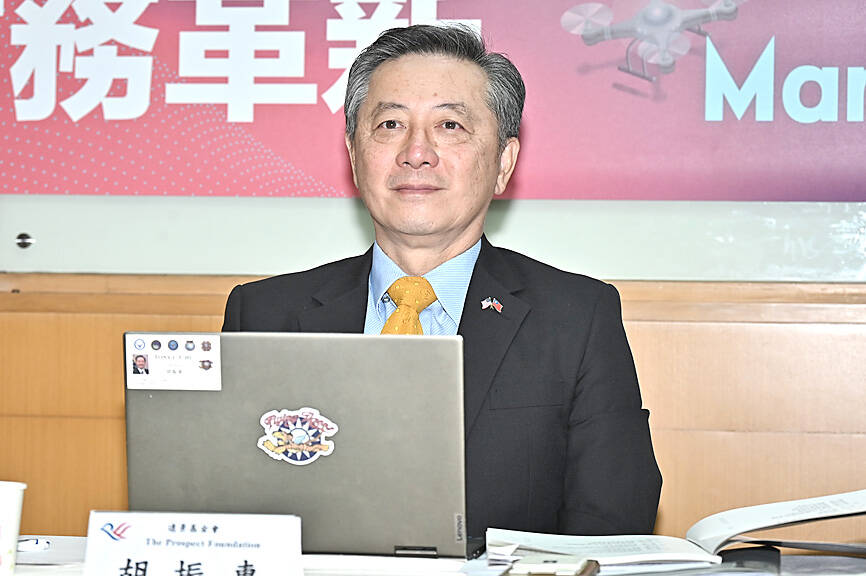Taiwan should ask to participate in military exercises with the US to strengthen joint deterrence and develop synergy between their forces, a former Pentagon official said on Tuesday.
“Taiwan should figure out ways to get something for itself on some issues, because the US will not take action,” Tony Hu (胡振東) said at a panel held by the Prospect Foundation, a Taipei-based think tank.
They were discussing the Ministry of National Defense’s Quadrennial Defense Review.

Photo: Tu Chien-jung, Taipei Times
Hu, who served as the first senior country director for Taiwan at the Pentagon, said Taiwan should ask to be an observer at the Rim of the Pacific (RIMPAC) exercise next year and strive toward becoming a full participant in 2028.
In the past, countries that participated in RIMPAC had concerns about Taiwan’s participation, but Taiwan now has a better chance at participating, as the international climate has changed, he said.
“I hope Taiwan has already gotten in touch with the Pentagon and the [US] Department of State to seek approval, and that it will gain the support of the [US] Info-Pacific Command,” Hu said.
Another opportunity would be whenever a US Navy vessel transits the Taiwan Strait for Taiwan’s navy to engage in passing exercises, or “PASSEXes,” with the US vessel, to test their data links and familiarize themselves with radio communications, Hu said.
Through such joint exercises, the two sides could also establish a common operating procedure, which would be crucial for data sharing on the battlefield, and define their roles and missions to develop synergy, he said.
The report included a section dedicated to the ministry’s plans on deepening military cooperation with the US, which it called an “important strategic partner” of Taiwan.
Regarding calls from US officials and a recent pledge by President William Lai (賴清德) to increase the defense budget, Hu supported the idea, saying the “cost of building a strong defense is but a small fraction of the cost of war, which would be an astronomical figure.”
Lai on Feb. 14 pledged to raise the defense budget from about 2.45 percent to at least 3 percent of the country’s GDP.
US undersecretary of defense for policy nominee Elbridge Colby said at a US Senate hearing this month that Taiwan needed to raise its defense spending to about 10 percent.
Prospect Foundation president Lai I-chung (賴怡忠), who moderated the panel, said that GDP is not a suitable metric for measuring Taiwan’s commitment to its defense, as the country’s general budget makes up only about 15 percent of its GDP, whereas the US’ federal budget accounts for about 25 percent of its GDP.
Therefore, if Taiwan spent 5 percent of its GDP on defense, or one-third of its general budget, it would seriously crowd out funds for other government functions, he said.

The manufacture of the remaining 28 M1A2T Abrams tanks Taiwan purchased from the US has recently been completed, and they are expected to be delivered within the next one to two months, a source said yesterday. The Ministry of National Defense is arranging cargo ships to transport the tanks to Taiwan as soon as possible, said the source, who is familiar with the matter. The estimated arrival time ranges from late this month to early next month, the source said. The 28 Abrams tanks make up the third and final batch of a total of 108 tanks, valued at about NT$40.5 billion

Two Taiwanese prosecutors were questioned by Chinese security personnel at their hotel during a trip to China’s Henan Province this month, the Mainland Affairs Council (MAC) said yesterday. The officers had personal information on the prosecutors, including “when they were assigned to their posts, their work locations and job titles,” MAC Deputy Minister and spokesman Liang Wen-chieh (梁文傑) said. On top of asking about their agencies and positions, the officers also questioned the prosecutors about the Cross-Strait Joint Crime-Fighting and Judicial Mutual Assistance Agreement, a pact that serves as the framework for Taiwan-China cooperation on combating crime and providing judicial assistance, Liang

A group from the Taiwanese Designers in Australia association yesterday represented Taiwan at the Midsumma Pride March in Melbourne. The march, held in the St. Kilda suburb, is the city’s largest LGBTQIA+ parade and the flagship event of the annual Midsumma Festival. It attracted more than 45,000 spectators who supported the 400 groups and 10,000 marchers that participated this year, the association said. Taiwanese Designers said they organized a team to march for Taiwan this year, joining politicians, government agencies, professionals and community organizations in showing support for LGBTQIA+ people and diverse communities. As the first country in Asia to legalize same-sex

MOTIVES QUESTIONED The PLA considers Xi’s policies toward Taiwan to be driven by personal considerations rather than military assessment, the Epoch Times reports Chinese President Xi Jinping’s (習近平) latest purge of the Chinese People’s Liberation Army (PLA) leadership might have been prompted by the military’s opposition to plans of invading Taiwan, the Epoch Times said. The Chinese military opposes waging war against Taiwan by a large consensus, putting it at odds with Xi’s vision, the Falun Gong-affiliated daily said in a report on Thursday, citing anonymous sources with insight into the PLA’s inner workings. The opposition is not the opinion of a few generals, but a widely shared view among the PLA cadre, the Epoch Times cited them as saying. “Chinese forces know full well that